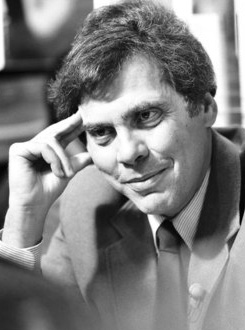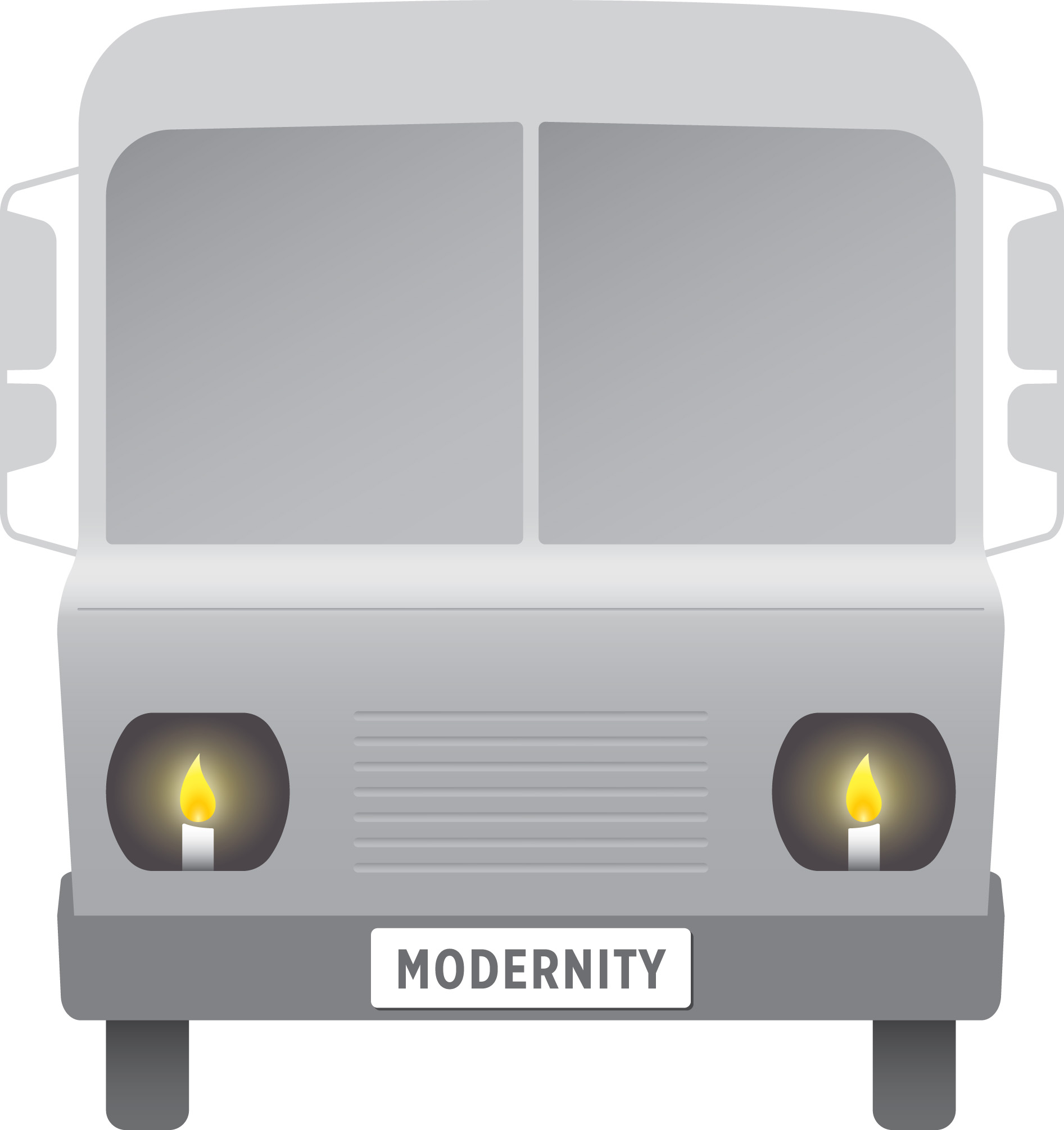Difference between revisions of "Holotopia"
m |
|||
| Line 4: | Line 4: | ||
<div class="col-md-3"><h3>Imagine...</h3></div> | <div class="col-md-3"><h3>Imagine...</h3></div> | ||
<div class="col-md-7"> | <div class="col-md-7"> | ||
| − | <p>It is 9PM. You are on a bus station, about to board a bus for a | + | <p>It is 9PM. You are on a bus station, about to board a bus for a whole night ride. You look at the bus, and notice that it has a pair of old-fashioned wax candles as headlights. You rub your eyes. Are you dreaming? Is this a weird joke? Or an art project?</p> |
| − | + | <p>Well of course, this is an absurd story. An impossibility, difficult even to imagine. So why are we talking about it? Because <em>on a much larger scale</em>—on the level of our society as a whole, where the things are so large that we cannot see them with naked eye—this is precisely what is going on.</p> | |
| − | Well of | ||
</div> </div> | </div> </div> | ||
| Line 17: | Line 16: | ||
"The tie between information and action has been severed. Information is now a commodity that can be bought and sold, or used as a form of entertainment, or worn like a garment to enhance one's status. It comes indiscriminately, directed at no one in particular, disconnected from usefulness; we are glutted with information, drowning in information, have no control over it, don't know what to do with it." | "The tie between information and action has been severed. Information is now a commodity that can be bought and sold, or used as a form of entertainment, or worn like a garment to enhance one's status. It comes indiscriminately, directed at no one in particular, disconnected from usefulness; we are glutted with information, drowning in information, have no control over it, don't know what to do with it." | ||
</blockquote> | </blockquote> | ||
| − | ☞ Neil Postman here serves as an <em>icon</em> of the | + | <big>☞</big>Neil Postman here serves as an <em>icon</em> of the relationship we (as people, and as society) have with information. For more detail, see the corresponding article. |
</p></div> | </p></div> | ||
<div class="col-md-3 round-images">[[File:Postman.jpg]]<br><small><center>Neil Postman</center></small></div> | <div class="col-md-3 round-images">[[File:Postman.jpg]]<br><small><center>Neil Postman</center></small></div> | ||
</div> | </div> | ||
| − | |||
| − | |||
<div class="row"> | <div class="row"> | ||
| − | <div class="col-md-3" | + | <div class="col-md-3"></div> |
| − | <div class="col-md- | + | <div class="col-md-6"> |
| − | < | + | <p> |
| − | |||
| − | |||
| − | |||
| − | |||
| − | |||
| − | |||
<blockquote><pre> | <blockquote><pre> | ||
| − | The crux of our knowledge federation proposal is | + | The crux of our knowledge federation proposal |
| − | to change the relationship we have with information. | + | is to change the relationship we as culture have |
| − | And | + | with information; and with knowledge. |
| + | And by doing that, change the relationship we have | ||
with the world; and with ourselves. | with the world; and with ourselves. | ||
</pre></blockquote> | </pre></blockquote> | ||
| − | |||
| − | |||
| − | |||
| − | |||
| − | |||
<p>Suppose we handled information as we handle other human-made thing—by suiting it to the various functions it needs to fulfill in our lives, and our society. Such as providing us <em>effective</em> knowledge; and <em>effective</em> meaning. What would the resulting information be like? By what methods, in what ways and by whom would it be created? How would information be used? What new information formats, what new <em>kinds</em> of information would emerge? How would the information technology be adapted and applied? In what way would our public informing be different? What would academic communication, and education, be like?</p> | <p>Suppose we handled information as we handle other human-made thing—by suiting it to the various functions it needs to fulfill in our lives, and our society. Such as providing us <em>effective</em> knowledge; and <em>effective</em> meaning. What would the resulting information be like? By what methods, in what ways and by whom would it be created? How would information be used? What new information formats, what new <em>kinds</em> of information would emerge? How would the information technology be adapted and applied? In what way would our public informing be different? What would academic communication, and education, be like?</p> | ||
<p>The <em>substance</em> of our <em>knowledge federation</em> proposal is a complete and academically coherent answer to those and other related questions; answers that are not only described and explained, but also implemented, as real-life embedded <em>prototypes</em>.</p> | <p>The <em>substance</em> of our <em>knowledge federation</em> proposal is a complete and academically coherent answer to those and other related questions; answers that are not only described and explained, but also implemented, as real-life embedded <em>prototypes</em>.</p> | ||
| − | |||
</div> | </div> | ||
<div class="col-md-3"> | <div class="col-md-3"> | ||
| Line 54: | Line 40: | ||
<small>By depicting our civilization as a bus, and our handling of information as its candle headlights, the Modernity <em>ideogram</em> renders the crux of our proposal in a nutshell.</small> | <small>By depicting our civilization as a bus, and our handling of information as its candle headlights, the Modernity <em>ideogram</em> renders the crux of our proposal in a nutshell.</small> | ||
</div> </div> | </div> </div> | ||
| + | |||
| + | <!-- | ||
| + | |||
| + | |||
<div class="row"> | <div class="row"> | ||
<div class="col-md-3"><h3>We are tangled up in a paradox</h3></div> | <div class="col-md-3"><h3>We are tangled up in a paradox</h3></div> | ||
Revision as of 09:58, 31 March 2020
Holotopia
Imagine...
It is 9PM. You are on a bus station, about to board a bus for a whole night ride. You look at the bus, and notice that it has a pair of old-fashioned wax candles as headlights. You rub your eyes. Are you dreaming? Is this a weird joke? Or an art project?
Well of course, this is an absurd story. An impossibility, difficult even to imagine. So why are we talking about it? Because on a much larger scale—on the level of our society as a whole, where the things are so large that we cannot see them with naked eye—this is precisely what is going on.
Seeing things whole
"The tie between information and action has been severed. Information is now a commodity that can be bought and sold, or used as a form of entertainment, or worn like a garment to enhance one's status. It comes indiscriminately, directed at no one in particular, disconnected from usefulness; we are glutted with information, drowning in information, have no control over it, don't know what to do with it."
☞Neil Postman here serves as an icon of the relationship we (as people, and as society) have with information. For more detail, see the corresponding article.
<p>Suppose we handled information as we handle other human-made thing—by suiting it to the various functions it needs to fulfill in our lives, and our society. Such as providing us effective knowledge; and effective meaning. What would the resulting information be like? By what methods, in what ways and by whom would it be created? How would information be used? What new information formats, what new kinds of information would emerge? How would the information technology be adapted and applied? In what way would our public informing be different? What would academic communication, and education, be like?The crux of our knowledge federation proposal is to change the relationship we as culture have with information; and with knowledge. And by doing that, change the relationship we have with the world; and with ourselves.
The substance of our knowledge federation proposal is a complete and academically coherent answer to those and other related questions; answers that are not only described and explained, but also implemented, as real-life embedded prototypes.


